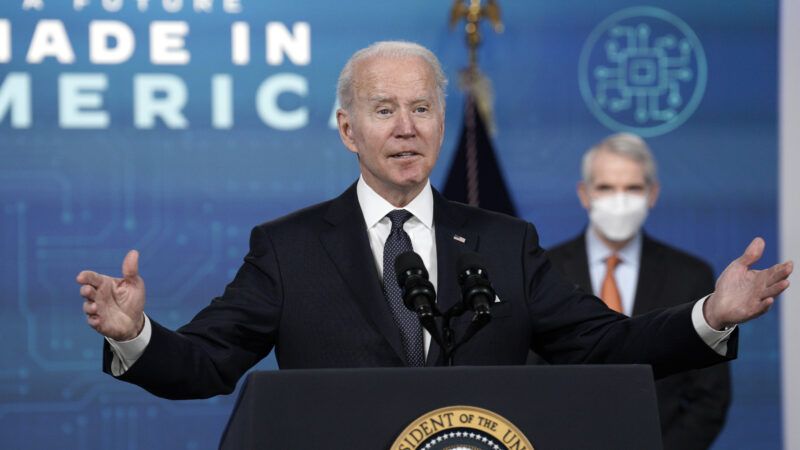Semiconductor Manufacturers Don't Need More Subsidies. They Need Less Government.
Fixing federal permitting rules and easing immigration policies would help companies like the Taiwan Semiconductor Manufacturing Company, which are interested in building more plants in America.

President Joe Biden will visit the site of a new semiconductor manufacturing facility in Arizona on Tuesday afternoon to tout what the White House sees as proof that it is solving global worries about high-tech supply chains with expensive subsidies and new industrial policy.
In reality, however, semiconductor manufacturers don't need more government handouts. They need less government getting in the way.
Biden's trip to Arizona will mark the first piece of equipment being installed within the massive facility that the Taiwan Semiconductor Manufacturing Company (TSMC) is building near Phoenix. The president will use the occasion to once again tout the passage of the CHIPS Act, which Congress passed and he signed earlier this year.
From the White House's perspective, the bill is literally responsible for the existence of tech manufacturing jobs in the United States. "He is going to continue to talk about…the CHIPS and Science Act," White House Press Secretary Karine Jean-Pierre said Monday when asked about the president's upcoming trip. She went on to describe the bill as "a bipartisan piece of legislation that is going to continue making sure that we have manufacturing jobs right here in the U.S."
But that ignores the fact that TSMC's plans for a new manufacturing plant in Arizona predate the CHIPS Act by more than two years. And there is no indication that TSMC or other top semiconductor makers are in need of handouts from taxpayers. Despite the pandemic-induced supply chain issues that caused headaches across huge swaths of the economy in recent years, all indications are that demand for semiconductors continues to boom and the industry is doing just fine.
But that doesn't mean there's not a role for government to play in helping to boost domestic chip production. It's just not the one that Biden has been pushing.
Indeed, it's not hard to find out what kind of help companies like TSMC are seeking. In a letter to the Commerce Department last month, the company said that the "real barrier" to expanding high-tech manufacturing in the U.S. "is [the] comparative cost to build and operate" facilities here vs. in Taiwan and other countries. Specifically, the letter pointed to "federal regulatory requirements" that have slowed construction and added unexpected costs, The Wall Street Journal reported this week.
If that sounds familiar, it's because those are the same complaints that just about everyone who tries to build anything in the United States has right now. For example, the renewable energy industry—another sector of the economy that the Biden administration is working to heavily subsidize at the taxpayers' expense—is similarly hamstrung by permitting requirements and expensive regulations.
Despite those problems, TSMC is committing to its American expansion. It announced last week that it plans to break ground on a second facility in Arizona that will manufacture the next generation of top-line chips. Filling those plants with workers, however, would be a lot easier if America's immigration system wasn't so screwed up.
About 40 percent of America's semiconductor engineering jobs belong to foreign-born workers, according to a 2020 report from Georgetown University. Any large-scale expansion of that work force is necessarily going to involve allowing more skilled foreign workers into the U.S.—and that's true no matter how many times Biden and other politicians wrap these projects in the language of economic nationalism.
The fact that U.S. immigration policy requires most foreign-born STEM workers to leave the country after completing grad school—unless they can win a visa lottery—is already being blamed for suffocating an Intel chip plant in Ohio. "To achieve the long-sought goal of returning high-end manufacturing to the United States, the country must, paradoxically, attract more foreign workers," Politico reported in July.
The great thing about easing federal regulatory burdens and expanding immigration is that it's not only high-end semiconductor manufacturers who will benefit. Pretty much every American business would be better off if it had to do less paperwork and could have access to a larger pool of potential talent.
If he was so inclined, Biden could use events like Tuesday's visit to the TSMC plant in Arizona to promote a radical rethinking of what it means to boost domestic manufacturing jobs: one that recognizes the reality of a global marketplace in which capital is highly mobile and a worker's country of birth shouldn't matter.
Instead, we'll get another round of praise for unnecessary, wasteful subsidies that help a handful of wildly successful corporations while failing to address the problems that those same companies say are holding back further investment in America.


Show Comments (81)